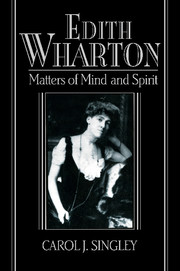3 - Calvinist Tortures
Published online by Cambridge University Press: 06 August 2010
Summary
That Calvinist sense of Innate Depravity and Original Sin, from whose visitations, in some shape or other, no deeply thinking mind is always and wholly free.
Herman Melville, Hawthorne and His MossesThat heart of New England which makes so pretty a phrase for print and so stern a fact, as yet, for feeling.
Henry James, The American SceneLife is the saddest thing there is.
Edith Wharton, A Backward GlanceEdith Wharton's elite social background places her in the tradition of genteel Protestantism. Yet a closer look reveals another sensibility that can only be characterized as evangelical – the spirituality commonly associated with Calvinism. Wharton's relationship to Calvinism is complex and even paradoxical, not only because Calvinism contrasted sharply with her upbringing, but because she resisted, on intellectual and aesthetic grounds, the austere doctrines to which she felt spiritually drawn. Her life and fiction reflect these ambiguities: deep moral belief tempered by rational skepticism, love of life's pleasures restrained by fear of their cost. Throughout Wharton's writing we can see this battle between conscience and convenience. In her New England fiction, particularly in Ethan Frome, Wharton gives full rein to her Calvinist impulses. She rejects the sunny interpretations of Darwinian theory that dispensed with God, sin, and punishment; she returns instead to the austerity of Calvinism, using it as a trope for the modernist condition of uncertainty and alienation.
- Type
- Chapter
- Information
- Edith WhartonMatters of Mind and Spirit, pp. 89 - 126Publisher: Cambridge University PressPrint publication year: 1995

